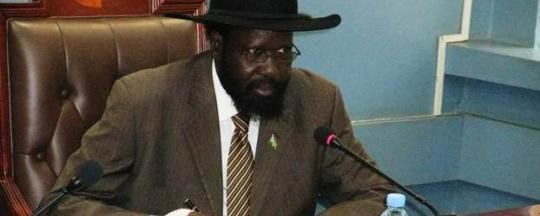South Sudan’s president, Salva Kiir, described on Monday Khartoum’s decision to shutdown Sudanese pipelines exporting Southern oil last Saturday as “very unfortunate” and announced that his government remains committed to implementing a cooperation agreement with Sudan.
In a letter sent by the Sudanese minister of Petroleum, Awad Ahmed Al-Jazz, confirmed that Sudan had suspended the agreement between the two nations on ‘Oil and Economic Matters’ on 9th June 2013.
“Reference is made to the decision of the government of Sudan Suspending the agreement between the government of Sudan on oil and economic matters as of 9th June 2013, we would like to inform you that the ministry of Petroleum will shut down the processing and transportation facilities in Sudan for the oil received from South Sudan,” reads part of a letter in Radio Tamazuj’s possession addressed to South Sudan’s Minister of Petroleum and Mining.
However, an earlier draft of the same letter, which was also acquired by Radio Tamazuj, seems to indicate a downsizing in the severity of the move by Sudan, as it had discussed suspending the cooperation agreements generally:
“Reference is made to the decision of the government of Sudan suspending the cooperation agreements between the government of Sudan and the Republic of South Sudan including the oil and related economic matters agreement as of 9th June 2013.”
At a press conference president Kiir said “on Saturday we heard that the government of Sudan has decided to close pipelines and not allow South Sudan’s oil to pass through their territory. Of course this was very unfortunate as we are working on the implementation of the cooperation agreement”.
President Kiir once again denied accusations of Juba providing support to Sudanese rebels is untrue.
“We are not supporting rebels in these areas. Where do we get the facilities to support these people”, he wondered.
President Kiir instead accused Khartoum of supporting rebels in his territory and declared that the government has evidence to this effect.
“We are going to show to the whole nation, the people of South Sudan, on the media and it will be shown to the whole world what Sudan is doing. The arms that have come to us now from all the armed groups that Sudan was harbouring and was arming them to come and fight South Sudan. They came with their guns and they said these were guns which were given to us by the Sudan to come and kill our own people. ‘We came and decided not to fight. Here they are,’” Kiir paraphrased.
Speaking of the wider impact that another oil shutdown could have, the South Sudanese president added:
“…This decision to prevent our oil from transiting through Sudan in order to reach the international market seriously undermines the September cooperation agreements and the implementation matrix.”
Instead, he proposed that if Sudan has legitimate grievances, they should file a complaint to the Joint Political Security Mechanism.
President Kiir went on to express his government’s disappointment with the African Union (AU) and United Nations (UN) for not doing enough to ensure that Sudan implemented the cooperation agreement.
“There are things that we are not happy with the African Union. The issue of Abyei is there (and) the African Union is not doing enough to tell Bashir to get out of Abyei and let the referendum be done, let the administration be established and let the referendum be done…” Kiir proclaimed.
When asked whether the referendum on Abyei’s future would take place as planned, President Kiir answered that the AU needs to ensure this and that he hopes it is carried out on time. He then urged all Abyei senior officials to leave Juba and return to Abyei to mobilise support for the referendum.
Meanwhile, Barnaba Benjamin Marial, the government’s spokesperson, told Miraya 101FM on Tuesday that Sudan currently has in its possession nearly six million barrels of oil.
“…yes, the oil is still flowing and is on its way. We expect it by weekend or around 20th or 21st to be actually in Port Sudan and shift to foreign market… Until the 9th – that is on Sunday – the oil of South Sudan which was already in Sudan was nearly 6 million barrels. These six million barrels cost about 580 million US dollars,” Marial added during the interview.
File photo: President Salva Kiir (Goss)




